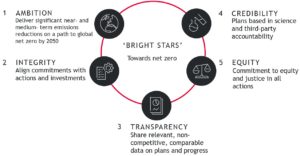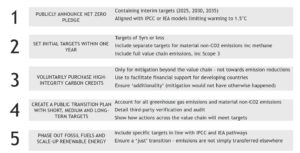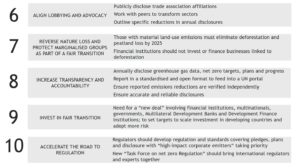The risks of greenwashing continue to accelerate and spread – most recently reaching the director level in (strongly contested) allegations set out in a world-first litigation action.
And with it, the appetite for knowledge in navigating and mitigating climate risks grows. We regularly advise clients on the steps to take. In this post, we take a look at advice that emerged at a global level during COP27 in Egypt. The 42-page report released by the United Nations’ High-Level Expert Group on the Net Zero Emissions Commitments of Non-State Entities (Expert Group) flew under the radar, but highlights a landmark shift towards guiding the actions businesses can take as they navigate the transition to net zero. It also emphasises the critically important role that businesses play.
Short-term science-based targets, detailed transition plans and long-term pledges are at the heart of the Expert Group’s recommendations for businesses. The timely release of the report, Integrity Matters: Net Zero Commitments by Businesses, Financial Institutions, Cities and Regions (the report), emphasises the risks associated with greenwashing (for more, see our recent Explainer). Yet it also highlights the opportunity for businesses that can adopt the clear and forensic approach outlined by the Expert Group.
The Expert Group makes it clear that decarbonisation requires not only integrity on the part of businesses and other non-state actors, but also formal rules and regulations issued by governments and other relevant authorities.
The UN climate change conference in Dubai in late November 2023 is expected to similarly take an action-oriented approach. While the regulatory framework to prevent greenwashing varies between jurisdictions, businesses should be aware of (and pre-emptively prepare for) the drive for additional measures to prevent greenwashing.
Tell me in two minutes (or less)!
- The report aims to encourage businesses, financial institutions, cities, regions and smaller non-government players to help “scale the ambition and action” needed for a sustainable planet.
- There are five key principles, described as “bright stars that should guide the setting and attaining of net zero targets” and intended to help businesses and other non-state actors move towards being net zero aligned.
- There are ten concrete, practical recommendations, including scaling-up renewable energy, setting transition plans and reporting publicly.
- The report was published after more than seven months of consultation by the UN-backed group of 17 experts from around the world.
- The UN is focused on stopping and discouraging greenwashing. Shortly after establishing the Expert Group in March 2022, UN Secretary General António Guterres delivered a stark warning to businesses in relation to the transition to net zero (for more, see our piece on the UN circling ‘Fake Movers’ and greenwashing).
- The report defines what it means to be ‘net zero’ or ‘net zero aligned’ and provides a roadmap to prevent greenwashing.
- Regulations must “establish a level playing field and ensure that ambition is always matched by action”.
- The Expert Group is chaired by Canada’s former Minister of Environment and Climate Change, Catherine McKenna. Members include:
-
- Climate Analytics CEO Bill Hare from Australia
- Council on Energy, Environment and Water CEO Dr Arunabha Ghosh from India
- The Sunrise Project program director Amanda Starbuck from the United Kingdom
- Spanish Financial Markets Authority commissioner Helena Viñes Fiestas.
-
I want to understand more…
Overarching principles
These five principles are labelled the “bright stars” that should guide the setting and attaining of net zero targets.

Who are non-state actors? And what does it mean to be ‘net zero-aligned’?
Non-state actors include organisations and individuals that are not affiliated with, directed by or funded through a government.
Recommendations in the report focus on large corporations, financial institutions, cities and regions. However, the Expert Group recognises that smaller non-state actors – like small businesses – also play an important role. The report emphasises the need to support smaller entities to ensure they too can support net zero transition.
As for ‘net zero’ and ‘net zero aligned’…
The terms ‘net zero’ and ‘net zero aligned’ refer to a point in time at which the volume of greenhouse gases released into the atmosphere are reduced to as close to zero as possible, and residual emissions are either reabsorbed or permanently sequestered.
Whilst commending voluntary commitments to reduce emissions, the Expert Group notes that too many of such commitments are not aligned with science, lack sufficient detail to be credible and use ‘net zero’ terminology inconsistently.
The Expert Group calls for regulation of businesses and other non-state actors to “ensure consistency, rigour and enforceability”.
What can businesses, banks, regulators and multilateral institutions do in practice? The ten recommendations.
The Expert Group sets out ten practical recommendations to bring integrity, transparency and accountability to net zero ambition by establishing clear standards and criteria, drawing from initiatives like Race to Zero and the Science Based Targets initiative (SBTi) .


What next – where does the Expert Group suggest you can start?
- Review net zero commitments – how do they compare with the Expert Group recommendations?
- Create a transition plan embedded within business strategy (of the world’s 1/3 largest publicly traded businesses with net zero commitments, only half show targets embedded and most only announce net zero targets or intentions)
- Update transition plans every five years
- Report progress annually
Revisit our stepping-stone guide to authentic action in our kwm.com insight on Fake Movers, Greenwashing on United Nations radar: how to respond?
‘While governments must take the lead in reducing emissions, action by non-state actors is critical to achieving global net zero.’ UN High-Level Expert Group on the Net Zero Emissions Commitments of Non-State Entities
Thank you to Michaela Tam for research and drafting assistance.











